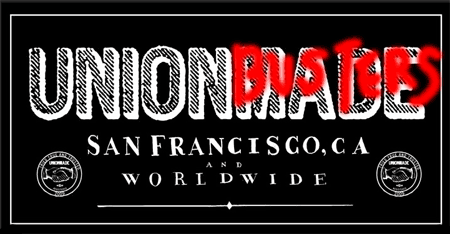
Via a rather pissed off AFL-CIOnow today, I came across a Gawker article about Californian clothing company Unionmade Goods. They sell upmarket priced downmarket looking clothing to the good hipster folk of the Bay Area.
All quite pleasant looking, if rather on the pricey side, and topped off with a woolly commitment to ethical sourcing, which is some way better than nowt for the fashion industry. But what’s this? Apparently the fact they’re called “Unionmade” and have a rip off US union logo, is not to be taken as any kind of inference that unions have been involved at any point in the process.
I saw something rather similar in the UK a few years back, when Firetrap tried a US blue-collar collection, replete with “union made” T-shirts. After badgering them for some time, they relented and told me that their line had nothing to do with unions at all.
It got me wondering, why is it that a fashion brand can think it can get away with abusing the union made mark? It’s not like they’d ever think twice about writing “Fair Trade”, “Organic Cotton”, or “Not tested on animals” on something that wasn’t.
I imagine in the rarified and union-free atmosphere of fashion design, they just see us as being a part of history to be plundered to get the right look. Even if they’re doing this out of a fond sort of nostalgia for better times, it’s a very harmful place for us to be if we let them get away with painting us into a historical corner.
For all the positive ethical choices that fashion companies can make in sourcing materials, none of them carries the guarantees that union made does – That the workers involved in the item’s production had an actual stake in the terms of their employment, not just relying on the extension of philanthropic whims.
You might like to big up that you make your clothes in a properly inspected factory. You might give your growers a fairer wage than the rest of the sector, or less harmful chemicals to work with. But if they don’t have a way to stand up for themselves, there isn’t the guarantee that things are going to stay good, especially when your buyer turns their back for a bit on the outsourced supplier you use.
So come on Unionmade Goods, wise up please. Exploiting your customers’ willingness to help low income workers in the garment sector is a pretty lousy way to make a big price premium on your clothes. Get it fixed and recruit some unionised suppliers (and hey, why not let your retail staff join too), and the next time in San Francisco, looking to spend $95 on a vintaged tweed tie, I’ll know where to get it.